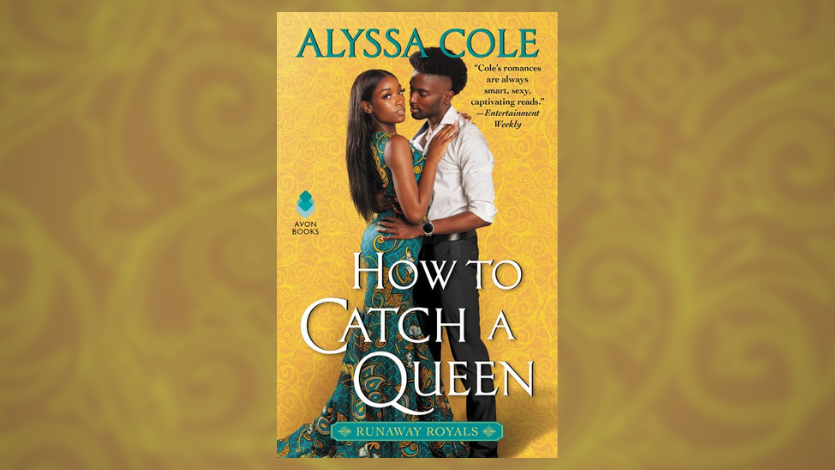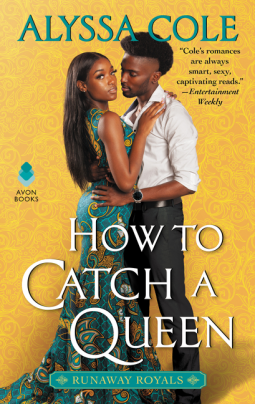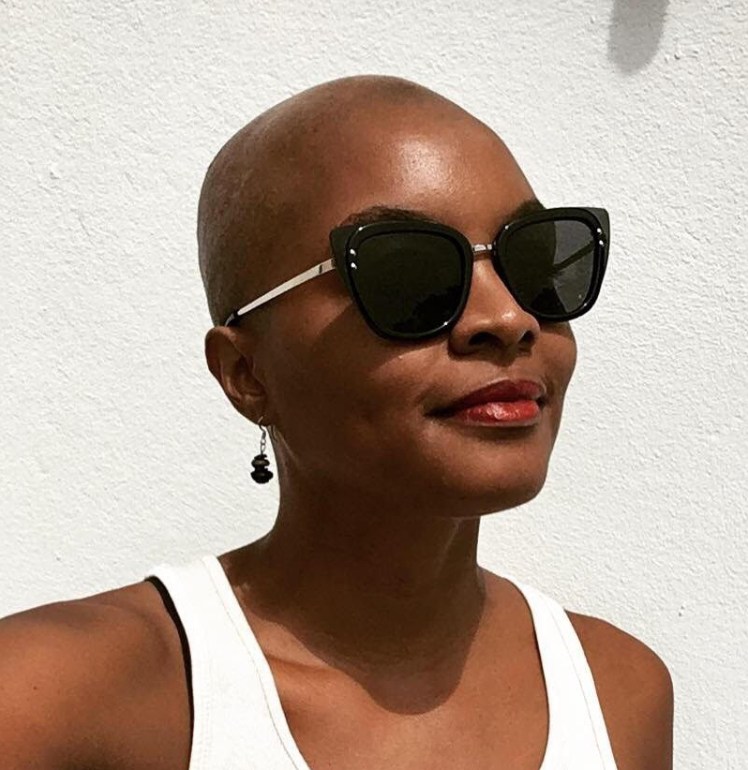
Alyssa Cole fans have a lot to be excited about. This year Cole has delivered three amazing novels: When No One Is Watching, the paperback of The A.I. Who Loved Me, and now the first in the Runaway Royals series: How to Catch a Queen. On shelves today, this romance follows newly married Shanti, who aspires to be a queen who can make the world a better place, and Sanyu, the king of Njaza who is struggling to find his way out of his father’s shadow. Here Cole talks about exploring royal marriages, strength, and toxic masculinity through the lens of this contemporary romance.
This is the first book in the Runaway Royals series, and your second contemporary romance series to focus on royalty. What drew you to the ‘runaway’ theme for this series? Is there anything you weren’t able to explore about royal life or relationships in Reluctant Royals that you’re hoping to in this series?
I jokingly call this series the even-more-Reluctant Royals, but I think that’s pretty much spot on. I think Runaway Royals is delving a bit deeper into the ways in which royalty and all of its trappings—which are often shown as enviable and as an aspirational fantasy—can actually be inhibiting from the inside. This was present in the Reluctant Royals series, but I wanted to examine it a bit more closely since it’s one of the things that interests me most about modern royalty. It’s also a fun challenge to examine the intersection of politics, duty, and personal desires through the lens of a romance.
I wanted to focus more on the actual effects of the duties of royalty on marriage and relationships, and familial relationships as well. Not the glitz and glamor, but the hard work of it and the decision making after the happily ever after. How does power affect and change people, for good and for bad? Who gives up what in these stories? What is worth giving up?
We’ve recently seen royals like Prince Harry and Meghan Markle forging their own path. Have stories like theirs influenced the way you think about the royal stories you’re telling?
Though Runaway Royals was a concept before Harry and Meghan’s issues that led to them leaving to forge their own path, Meghan’s story did resonate a lot with what I was aiming for in this book. On some level, How To Catch A Queen is a modern take on the “Highland laird takes a wife” trope, with its marriage of convenience to a headstrong foreign wife trying to change how things are done, but it is also a look at how difficult it is for women and marginalized people to be taken seriously by the systems they’re trying to change, and how they’re made to feel they should just be happy to be given a seat somewhere in the vicinity of the table. Meghan’s treatment, unfortunately, gave us a front row view to how power can be used to harm people who represent change. Meghan and Harry’s decision to leave shows us that there are ways to reject those systems and institutions.
What inspiration did you draw on when creating the fictional kingdom of Njaza and it’s religion?
When I started this book, Njaza’s religion didn’t play a role at all, but as the story went on, it became more and more important—and in the end, How To Catch A Queen became a romance with somewhat traditional fantasy worldbuilding in a modern contemporary romance setting. It’s not based on any one religion, but I did research religions and mythology from around Central Africa to see which elements could both fit the fictional kingdom of Njaza in the kind of alt-universe of Reluctant Royals and be organic and respectful of actual countries in the region in reality (i.e., not just creating them whole cloth from a totally Western viewpoint of what an “African” religion would be). I also researched things like staple crops and regional cultural markers that were true to more than one country, but Njaza’s political situation is a reflection of issues that arise around the world: What are the lasting effects of war and colonization? How are women and marginalized groups denied agency? How do older and younger generations come to a consensus about the future?
The ‘Field Guide to Queendom’ is a notebook of quotes that Shanti created to guide herself. What quote would you add to her book if you could?
“We can only do what we are able to do at any given time and under a single set of circumstances, and we must not feel unsuccessful in any one attempt. The opportunity will rise again to do something else, and the courage to act will rise with it.” —Betty Reid Soskin, Sign My Name To Freedom, A Memoir of A Pioneering Life
One of the themes in this book is holding people accountable, but also giving them room to fix their mistakes and grow. When writing heroes confronting toxic masculinity (like Sanyu does) how do you find the balance between showing how insidious and damaging those ideas and behaviors can be while still crafting a hero readers want to root for?
It was a hard tightrope to walk. Sanyu really messes up at times (though to be fair, Shanti does too), and I was annoyed with him when writing! But I also tried to have him mess up in ways that were realistically hurtful, but not cruel. I just tried to make him a good man caught up in a bad system, and to show how many of his reactions were caused by fear and grief. In this story, Sanyu is actually the princess trapped in the tower by the dragon, with that dragon being toxic masculinity. Shanti is the knight who saves him, or helps him save himself, without coddling him though. I think that makes it easier to root for him.
Strength looks different for both Sanyu and Shanti. It’s expected of Sanyu (to the point of incapacitating him), while Shanti often needs to wield it to be seen or is mocked for the way it reveals her ambitions. Is strength in all its forms something you knew you wanted to incorporate early on or did it develop as you got deeper into the story?
I knew what I wanted to get into with Sanyu more—him and Johan, in particular, are two ways of looking at the effects of toxic masculinity but from different angles shaped by the characters’ specific backgrounds.
With Shanti, I had the base idea of an examination of how people react to powerful women. There’s a lot of talk about girl power, lean in, etc, etc, but when women actually ask for things—when women actually display competence that isn’t veiled by deferring to someone else or humility—it often garners a negative reaction. We’ve seen this play out in American politics, with calls for female politicians to smile more, to be softer (though of course women who smile and show softness also garner a negative reaction). We’ve seen Serena Williams be called all kinds of names for showing anger on the court when playing tennis, when it’s a regular occurrence for male players. In Njaza, I was trying to capture the specific kind of dynamic of a world that tells women (and other marginalized people) that the world is their oyster if they just try hard enough, then smacks their hands away and calls them greedy when they reach for a pearl.
Readers will have to wait until May to read the next book in the series, How to Find a Princess. Which romances do you recommend they pick up while they wait?
My favorite of the year thus far has been Make a Scene by Mimi Grace. It’s a contemporary fake-dating rom-com with a baker in need of a date to her cousin’s wedding (the cousin is marrying her ex). The hot gym owner next door agrees to go with her in exchange for parking spot privileges. It’s just so funny and adorable.
Also, Courtney Milan’s The Duke Who Didn’t is a historical romance with a sauce-making heroine, who carries around a clipboard and is out for revenge, and the man who has loved her for half his life, but has conveniently forgotten to mention he is a duke.
Alyssa Cole is an award-winning author of historical, contemporary romance, and SFF romance. She’s contributed to publications including Shondaland, The Toast, Vulture, RT Book Reviews, and Heroes and Heartbreakers, and her books have received critical acclaim from Library Journal, Kirkus, Booklist, Jezebel, Vulture, Book Riot, Entertainment Weekly, and various other outlets. When she’s not working, she can often be found watching anime with her husband or wrangling their menagerie of animals. Visit her at www.alyssacole.com.




